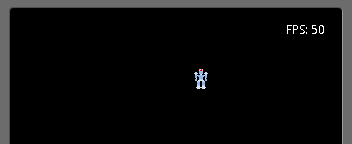Measuring FPS
In the previous entry we have created a game loop that runs at a constant speed and constant (more or less) FPS.
How can we measure it?
Check the new MainThread.java class.
package net.obviam.droidz;
import java.text.DecimalFormat;
import android.graphics.Canvas;
import android.util.Log;
import android.view.SurfaceHolder;
/**
* @author impaler
*
* The Main thread which contains the game loop. The thread must have access to
* the surface view and holder to trigger events every game tick.
*/
public class MainThread extends Thread {
private static final String TAG = MainThread.class.getSimpleName();
// desired fps
private final static int MAX_FPS = 50;
// maximum number of frames to be skipped
private final static int MAX_FRAME_SKIPS = 5;
// the frame period
private final static int FRAME_PERIOD = 1000 / MAX_FPS;
// Stuff for stats */
private DecimalFormat df = new DecimalFormat("0.##"); // 2 dp
// we'll be reading the stats every second
private final static int STAT_INTERVAL = 1000; //ms
// the average will be calculated by storing
// the last n FPSs
private final static int FPS_HISTORY_NR = 10;
// last time the status was stored
private long lastStatusStore = 0;
// the status time counter
private long statusIntervalTimer = 0l;
// number of frames skipped since the game started
private long totalFramesSkipped = 0l;
// number of frames skipped in a store cycle (1 sec)
private long framesSkippedPerStatCycle = 0l;
// number of rendered frames in an interval
private int frameCountPerStatCycle = 0;
private long totalFrameCount = 0l;
// the last FPS values
private double fpsStore[];
// the number of times the stat has been read
private long statsCount = 0;
// the average FPS since the game started
private double averageFps = 0.0;
// Surface holder that can access the physical surface
private SurfaceHolder surfaceHolder;
// The actual view that handles inputs
// and draws to the surface
private MainGamePanel gamePanel;
// flag to hold game state
private boolean running;
public void setRunning(boolean running) {
this.running = running;
}
public MainThread(SurfaceHolder surfaceHolder, MainGamePanel gamePanel) {
super();
this.surfaceHolder = surfaceHolder;
this.gamePanel = gamePanel;
}
@Override
public void run() {
Canvas canvas;
Log.d(TAG, "Starting game loop");
// initialise timing elements for stat gathering
initTimingElements();
long beginTime; // the time when the cycle begun
long timeDiff; // the time it took for the cycle to execute
int sleepTime; // ms to sleep (<0 if we're behind)
int framesSkipped; // number of frames being skipped
sleepTime = 0;
while (running) {
canvas = null;
// try locking the canvas for exclusive pixel editing
// in the surface
try {
canvas = this.surfaceHolder.lockCanvas();
synchronized (surfaceHolder) {
beginTime = System.currentTimeMillis();
framesSkipped = 0; // resetting the frames skipped
// update game state
this.gamePanel.update();
// render state to the screen
// draws the canvas on the panel
this.gamePanel.render(canvas);
// calculate how long did the cycle take
timeDiff = System.currentTimeMillis() - beginTime;
// calculate sleep time
sleepTime = (int)(FRAME_PERIOD - timeDiff);
if (sleepTime > 0) {
// if sleepTime > 0 we're OK
try {
// send the thread to sleep for a short period
// very useful for battery saving
Thread.sleep(sleepTime);
} catch (InterruptedException e) {}
}
while (sleepTime < 0 && framesSkipped < MAX_FRAME_SKIPS) {
// we need to catch up
this.gamePanel.update(); // update without rendering
sleepTime += FRAME_PERIOD; // add frame period to check if in next frame
framesSkipped++;
}
if (framesSkipped > 0) {
Log.d(TAG, "Skipped:" + framesSkipped);
}
// for statistics
framesSkippedPerStatCycle += framesSkipped;
// calling the routine to store the gathered statistics
storeStats();
}
} finally {
// in case of an exception the surface is not left in
// an inconsistent state
if (canvas != null) {
surfaceHolder.unlockCanvasAndPost(canvas);
}
} // end finally
}
}
/**
* The statistics - it is called every cycle, it checks if time since last
* store is greater than the statistics gathering period (1 sec) and if so
* it calculates the FPS for the last period and stores it.
*
* It tracks the number of frames per period. The number of frames since
* the start of the period are summed up and the calculation takes part
* only if the next period and the frame count is reset to 0.
*/
private void storeStats() {
frameCountPerStatCycle++;
totalFrameCount++;
// check the actual time
statusIntervalTimer += (System.currentTimeMillis() - statusIntervalTimer);
if (statusIntervalTimer >= lastStatusStore + STAT_INTERVAL) {
// calculate the actual frames pers status check interval
double actualFps = (double)(frameCountPerStatCycle / (STAT_INTERVAL / 1000));
//stores the latest fps in the array
fpsStore[(int) statsCount % FPS_HISTORY_NR] = actualFps;
// increase the number of times statistics was calculated
statsCount++;
double totalFps = 0.0;
// sum up the stored fps values
for (int i = 0; i < FPS_HISTORY_NR; i++) {
totalFps += fpsStore[i];
}
// obtain the average
if (statsCount < FPS_HISTORY_NR) {
// in case of the first 10 triggers
averageFps = totalFps / statsCount;
} else {
averageFps = totalFps / FPS_HISTORY_NR;
}
// saving the number of total frames skipped
totalFramesSkipped += framesSkippedPerStatCycle;
// resetting the counters after a status record (1 sec)
framesSkippedPerStatCycle = 0;
statusIntervalTimer = 0;
frameCountPerStatCycle = 0;
statusIntervalTimer = System.currentTimeMillis();
lastStatusStore = statusIntervalTimer;
// Log.d(TAG, "Average FPS:" + df.format(averageFps));
gamePanel.setAvgFps("FPS: " + df.format(averageFps));
}
}
private void initTimingElements() {
// initialise timing elements
fpsStore = new double[FPS_HISTORY_NR];
for (int i = 0; i < FPS_HISTORY_NR; i++) {
fpsStore[i] = 0.0;
}
Log.d(TAG + ".initTimingElements()", "Timing elements for stats initialised");
}
}
I introduced a simple measuring function. I count the number of frames every second and store them in the fpsStore[] array. The storeStats() is called every tick and if the 1 second interval (STAT_INTERVAL = 1000;) is not reached then it simply adds the number of frames to the existing count.
If the one second is hit then it takes the number of rendered frames and adds them to the array of FPSs. After this I just reset the counters for the current statistics cycle and add the results to a global counter. The average is calculated on the values stored in the last 10 seconds.
Line 171 logs the FPS every second while line 172 sets the avgFps value of the gamePanel instance to be displayed on the screen.
The MainGamePanel.java class’s render method contains the the displayFps call which just draws the text onto the top right corner of the display every time the state is rendered. It also has a private member that is set from the thread.
// the fps to be displayed
private String avgFps;
public void setAvgFps(String avgFps) {
this.avgFps = avgFps;
}
public void render(Canvas canvas) {
canvas.drawColor(Color.BLACK);
droid.draw(canvas);
// display fps
displayFps(canvas, avgFps);
}
private void displayFps(Canvas canvas, String fps) {
if (canvas != null && fps != null) {
Paint paint = new Paint();
paint.setARGB(255, 255, 255, 255);
canvas.drawText(fps, this.getWidth() - 50, 20, paint);
}
}
Try running it. You should have the FPS displayed in the top right corner.

FPS Displayed
